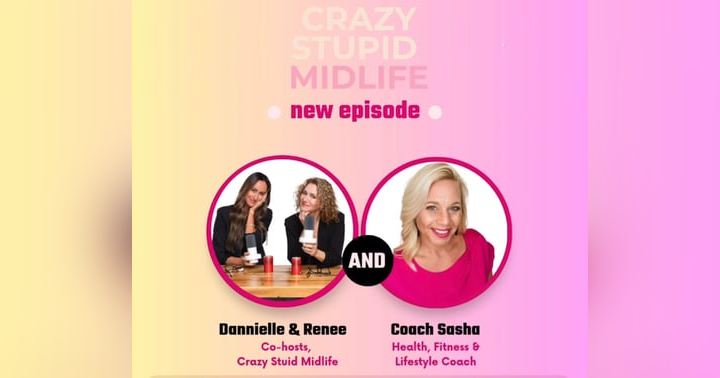The Double Edge of 'Stupid': Cringe vs. Glory

In a world that often prizes perfection and flawless execution, it's easy to shy away from anything that might be perceived as "stupid." But what if we told you that embracing the "stupid" parts of life – the mistakes, the missteps, the messy moments – could actually unlock some of the most rewarding and transformative experiences? In this blog post, we'll be diving deep into the dual nature of 'stupid,' acknowledging both the embarrassing cringe and the exhilarating glory it encompasses. We'll explore why we chose this word for our podcast, offer practical advice on reframing regrets, and share some personal anecdotes to illustrate how turning 'stupid' into something brilliant can be a midlife manifesto. This conversation builds directly on our latest podcast episode, Welcome to Stupid, where we unpack the why behind this loaded word. Give it a listen for even more insights!
Introduction: Reclaiming 'Stupid'
Let’s face it: "stupid" isn’t exactly a word you’d expect to find in a self-help guide or motivational speech. More often, it’s used as a weapon, a put-down, a label meant to diminish and shame. But what if we could reclaim it? What if, instead of being a source of embarrassment, "stupid" could become a badge of honor, a reminder that we’re willing to take risks, to learn from our mistakes, and to embrace the beautiful chaos of life? This is the premise we’re exploring. We're not advocating for reckless abandon or willful ignorance, but rather for a shift in perspective. One that allows us to see the inherent value in the moments when we stumble, when we deviate from the "right" path, and when we dare to do things that others might deem foolish.
Why 'Stupid'? Unpacking Our Podcast Title
So, why "stupid"? It might seem like an odd choice for a podcast that aims to inspire and empower. But that's precisely the point. We wanted a word that would challenge assumptions, spark curiosity, and invite listeners to question the conventional wisdom about what it means to live a good life. "Stupid," in our context, isn't about intellectual deficiency. It's about the freedom to be imperfect, the courage to try new things, and the willingness to laugh at ourselves along the way. It's about recognizing that some of the most valuable lessons we learn come from the mistakes we make. Choosing "stupid" was a conscious decision to confront the negativity and shame that often surround failure. We wanted to create a space where it's okay to be a work in progress, to admit when you don't have all the answers, and to celebrate the journey, even when it's messy and unpredictable.
The Double Edge: Cringe vs. Glory
The truth is, "stupid" cuts both ways. On one side, there’s the cringe – the awkward moments, the embarrassing missteps, the regrets that keep us up at night. We've all been there: saying the wrong thing at the wrong time, making a decision that backfires spectacularly, or simply having a moment of inexplicable brain fog. These are the "stupid" moments we'd rather forget. But on the other side of the coin, there's the glory. The exhilarating feeling of taking a risk and succeeding, the unexpected discoveries that come from veering off course, the personal growth that emerges from overcoming challenges. These are the "stupid" moments that shape us, inspire us, and ultimately make us who we are. The key is to acknowledge both sides of the equation. To recognize that the cringe and the glory are inextricably linked, and that you can't have one without the other. To embrace the full spectrum of human experience, with all its imperfections and contradictions.
Embracing Mistakes: Finding Value in Missteps
Mistakes are inevitable. No matter how careful we are, how much we plan, or how hard we try, we're all going to screw up from time to time. The question is, what do we do with those mistakes? Do we dwell on them, beat ourselves up, and let them define us? Or do we learn from them, grow from them, and use them as fuel for future success? Embracing mistakes is about shifting our mindset from one of fear and avoidance to one of curiosity and exploration. It's about seeing mistakes not as failures, but as opportunities for growth. When we make a mistake, it's a chance to examine our assumptions, to identify our weaknesses, and to develop new strategies for overcoming challenges. It's also a chance to practice self-compassion, to forgive ourselves for being imperfect, and to move forward with renewed determination. To truly embrace mistakes is to understand that failure is not the opposite of success; it's a necessary ingredient.
Taking Risks: The Boldness of 'Stupid' Decisions
Sometimes, the "smartest" thing you can do is take a risk that others might consider "stupid." These are the decisions that defy conventional wisdom, that push you outside your comfort zone, and that have the potential to change your life in profound ways. Quitting a stable job to pursue your passion, starting a business without a guaranteed income, or moving to a new city without knowing anyone – these are all examples of "stupid" decisions that can lead to incredible rewards. Taking risks requires courage, vision, and a willingness to embrace uncertainty. It means trusting your intuition, believing in your abilities, and being prepared to face the possibility of failure. But the potential payoff is enormous. By taking risks, we open ourselves up to new opportunities, new experiences, and new perspectives. We challenge ourselves to grow, to learn, and to become the best version of ourselves. Remember, the greatest regrets in life often come not from the risks we take, but from the risks we don't take.
Reframing Regrets: Learning from Cringeworthy Moments
We all have regrets. Those moments in our past that make us cringe, that we wish we could undo, or that we simply can't believe we actually did. While it's impossible to erase the past, it is possible to reframe our regrets and learn from our cringeworthy moments. The first step is to acknowledge the regret without judgment. Don't beat yourself up or dwell on the negative emotions. Instead, try to understand why you feel the way you do. What specific actions or decisions do you regret? What were the circumstances surrounding those events? Once you have a clearer understanding of the situation, you can begin to extract the lessons. What did you learn from the experience? What would you do differently next time? How can you use this knowledge to make better decisions in the future? Reframing regrets is about turning them into valuable learning experiences that contribute to your personal growth.
Personal Anecdotes: Our 'Stupid' Stories
To illustrate the double edge of "stupid," we want to share a few personal anecdotes from our own lives. One of us (name withheld to protect the guilty) once spent an entire afternoon trying to assemble a piece of furniture backward, convinced that the instructions were wrong. The result was a mangled mess and a lot of frustration. In hindsight, it was a "stupid" mistake, but it taught a valuable lesson about the importance of following instructions (and maybe asking for help when needed). A. They remind us that it's okay to make mistakes, to try new things, and to laugh at ourselves along the way.
Practical Advice: How to Laugh Through the Chaos
So, how can you embrace the "stupid" parts of life without completely losing your mind? Here are a few practical tips:
- Cultivate a sense of humor: Learn to laugh at yourself and your mistakes. Don't take life too seriously.
- Practice self-compassion: Be kind to yourself when you screw up. Forgive yourself for being imperfect.
- Focus on the learning: Extract the lessons from your mistakes. Use them to grow and improve.
- Embrace imperfection: Accept that you're not always going to get it right. That's okay.
- Take calculated risks: Don't be afraid to step outside your comfort zone. Just be sure to weigh the potential risks and rewards.
- Surround yourself with supportive people: Find friends and family who will encourage you, challenge you, and laugh with you.
- Celebrate small wins: Acknowledge your progress, no matter how small. Every step forward is a victory.
By incorporating these practices into your life, you can learn to navigate the chaos with grace, resilience, and a healthy dose of humor.
Turning 'Stupid' into Brilliant: A Midlife Manifesto
Midlife is a time of transition, reflection, and reinvention. It's a time to question our assumptions, to challenge our beliefs, and to redefine our priorities. It's also a time to embrace the "stupid" parts of life and turn them into something brilliant. This means taking risks, pursuing our passions, and living life on our own terms. It means letting go of the need for perfection, embracing our imperfections, and celebrating our uniqueness. It means choosing authenticity over conformity, joy over obligation, and adventure over routine. Turning "stupid" into brilliant is about creating a life that is meaningful, fulfilling, and aligned with our values. It's about living with intention, purpose, and a healthy dose of irreverence. It's about owning our stories, embracing our flaws, and creating a legacy that we can be proud of.
Conclusion: Redefining 'Stupid' in the Best Way
In conclusion, "stupid" is not a word to be feared or avoided. It's a word to be embraced, redefined, and ultimately transformed into something positive and empowering. By acknowledging the double edge of "stupid" – the cringe and the glory – we can learn to navigate the challenges of life with greater resilience, humor, and self-compassion. By embracing mistakes, taking risks, and reframing regrets, we can unlock our full potential and create lives that are meaningful, fulfilling, and authentically our own. So, the next time you're tempted to shy away from something that might be perceived as "stupid," remember the lessons we've explored in this blog post and in our latest podcast episode, Welcome to Stupid. Dare to be different, dare to be imperfect, and dare to turn "stupid" into something truly brilliant. You might just surprise yourself.


